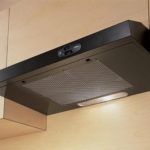Cooker hoods without ventilation (recirculation) are the ideal solution for small kitchens. In addition, it is they who help maintain the integrity and attractiveness of the kitchen design. Another important plus of the recirculation hood for the kitchen is the ease of installation. Following the instructions, even a person with little experience in construction work can cope with their installation. The hood is installed without an air duct on a frame, which is fastened with just a few bolts. In essence, they are built-in appliances, the configuration of which can be easily adjusted to the peculiarities of kitchen furniture and its design. This approach significantly saves time and effort for users.
Advantages of an exhaust hood without venting into ventilation
One should not forget about such an important factor as the noise level. For kitchen hoods without an air duct, it is so low that they can be called practically silent. This is a very important condition for small apartments, housing in which the kitchen is combined with the dining room or is located next to the bedroom. Another plus hoods for the kitchen without an air duct - higher air quality, something that standard flow models can provide. After all, it is not easy for fresh air to enter your apartment, but the most purified air returns.
The principle of operation of such a hood is based on air flow through special filter elements built into the device. At the exit you get clean air, free from unpleasant odors and impurities. That is why hoods for the kitchen without an outlet are often called recirculating, because the air after passing through the cleaning system returns to the same room, and does not leave at all. A modern hood without an air duct purifies the air in the kitchen in two stages. On the first, it passes the fat compartment, in which particles of soot and grease are removed. On the second, an unpleasant odor is removed.
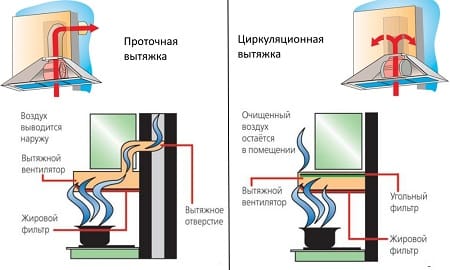
As for the choice of specific models, it is almost limitless. Today all types of hoods for the kitchen with recirculation, not only standard, but also corner models. Their installation is possible at any height and in any part of the kitchen. You can choose elegant, almost invisible models made of durable glass exclusively to your taste. Thin metal models in techno style are no less popular.
Recently, suspended recirculation hoods for the kitchen installed in the center of the room are in great demand. In small kitchens, a wall-mounted hood with a charcoal filter will look great. One of the most modern models of hoods without an air duct is inclined. Their distinctive feature is the body is inclined at an angle to the floor. Thanks to this solution, it is possible to save useful kitchen space. In addition, tilting devices have a high operating efficiency due to more efficient air intake. The latter is especially important if the equipment is not installed directly above the stove.
But it's not just design that matters.For efficient operation of the hood, be sure to calculate its required power. This is done by multiplying the height of the room by its area and multiplying the result by 12 or 10. The final result will show the required exhaust ventilation power for your kitchen.
See also:
- 5 best Shindo kitchen hoods according to customer reviews
- The 7 best LEX range hoods
- 8 best Bosch range hoods of 2019
- 8 best Elica range hoods according to customer reviews
- 8 best Gorenje kitchen hoods according to customer reviews
- 9 best ELIKOR cooker hoods
- Top 10 Hansa range hoods according to customer reviews
Caring for a kitchen hood without an air duct
In order for ventilation for the kitchen to serve for a long time and to please you with its efficiency, it is necessary to keep the equipment clean and replace filters on time. The filtration system for circulating hoods can be disposable or reusable.
The number of disposable filter elements that can be completed with circulation-type kitchen hoods without connection to central ventilation include products from the following materials:
- paper;
- synthetic winterizer;
- non-woven fabric;
- coal.
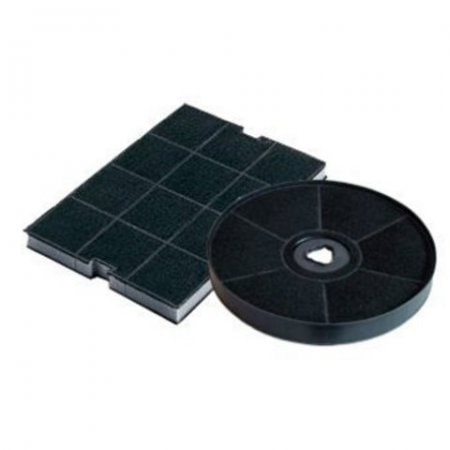
Replacement of disposable filters is carried out immediately, as soon as you find that the marks on their surface are no longer visible under the fat deposited on them.
The hood without an air duct is also equipped with disposable carbon filters. They are distinguished by their exceptional functionality and provide the deepest air purification due to the absorption properties of the material. The service life of carbon filters is up to six months. Some models last no more than three months. ( See also: How to clean the hood from soot and fat with folk remedies )
Reusable filter parts are made from the following materials:
- acrylic;
- metal.
Acrylic filters in the ventilation system have a soft texture and a higher degree of flexibility. However, at the same time they are very fragile and do not withstand strong physical impact. To reuse acrylic filter models, it is recommended to manually clean them using an aqueous solution of laundry soap. After rinsing the filter, it should be placed in a horizontal position for water to drain off or hung carefully. These products must not be wrung out, as this will lead to their mechanical damage. It should be noted that after each subsequent cleaning, the efficiency of their work is significantly reduced. That is why experts do not recommend washing acrylic material more than once.
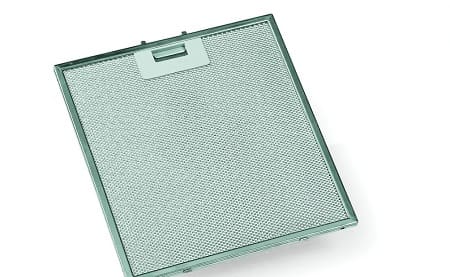
Metal filters are much more durable for ventilation. They are products made of perforated aluminum, flexible and resistant to negative mechanical impact. These items can withstand multiple cleanings. You can wash them by hand or you can use a regular dishwasher for this. At the same time, it is not recommended to clean the filters together with the dishes. A standard degreaser can be used to clean aluminum filters.
How to replace the filter in a kitchen hood without venting into the ventilation?
Such an operation will not cause difficulties even for a user inexperienced in technology, a woman or an elderly person. In terms of time, the solution to this problem will take no more than five minutes.
A special type of hoods without an air duct is equipment without filtering parts. Install compact hood it is possible in any room, which standard kitchen hoods with connection to a central ventilation system cannot boast of.
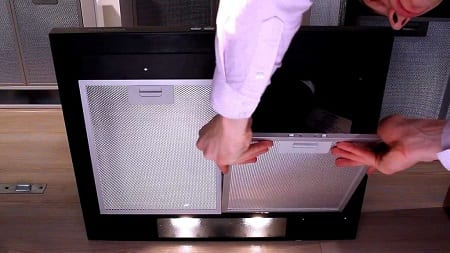
When planning to clean the hood housing or replace filters, do not neglect the safety precautions. Carry out any work only with the equipment turned off. Moreover, it is desirable that it is not easy to stop the operation of the hood, but also to disconnect the plug from the mains.
It is recommended to remove accumulated fatty and dusty deposits from the hood with soft sponges that will not damage the transparent glass or shiny metal surface. It is not recommended to use aggressive detergents for this with a large proportion of bleaching components and acids.
See also:

